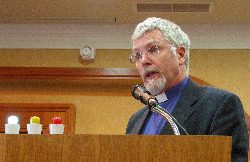



|
|
|
TUESDAY'S NEWS Report on Bill No 1 The first bill considered by the General Synod in 2003 sought to bring the wording of certain texts into line with the recent English Language Liturgical Consultation (ELLC). The ELLC’s aim is to standardise the texts of prayers, creeds and canticles common to all churches of the Anglican Communion who use English in their liturgies.
An amendment to the ELLC version of the Apostles’ Creed proposed by the Very Rev Herbert Cassidy sought to undo the proposed change in the third line to “I believe in Jesus Christ, God’s only Son, our Lord” (previously “his only Son”). Mrs Gina Hibbert of the Diocese of Connor disagreed with the suggestion that local difference was to be avoided and told Synod members that the desire to remove masculine pronouns would cause inconsistency in the prayer book. But the amendment was defeated, leading to the withdrawal of several similar amendments affecting other texts. The use of inclusive language was supported by the Rev Olive Donohoe, who said it was “being gracious to all and being inclusive to all”. The Rev Glenn Milne of the Diocese Meath and Kildare was in favour of inclusive language as applied to human beings but said it was a more difficult approach to apply it to God and expressed concern that the truth of the incarnation would be occluded by the removal of references to Jesus’s being “made man”. Thanks to a successful amendment the Nicene Creed retains the phrase “and was made man” in the face of the ELLC proposal “and became truly human”. This means that the Creed will remain as before except for the replacement of the lines “by the power of the Holy Spirit / he became incarnate of the Virgin Mary” with “was incarnate by the Holy Spirit of the Virgin Mary” in keeping with the original Greek of one line. This represents the only LAC-sponsored deviation from the ELLC’s recommendations. The new prayer book will remain faithful to the version of the Lord’s Prayer already familiar to users of the Church of Ireland’s Alternative Prayer Book. A successful amendment ensured that the familiar line “And lead us not into temptation” will not be changed to “Save us from the time of trial” as had been proposed by the ELLC. A further proposal to alter the phrase “daily bread” to “bread of tomorrow” in keeping with the original Aramaic was defeated. If Bill No 1 passes the final stages on the third day of Synod its provisions will come into force with the publication of the new Book of Common Prayer in 2004. |
![]()
If you have any questions, comments or problems
please contact us.
Copyright © 2003 Church of Ireland. All rights reserved.
